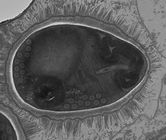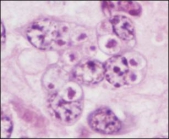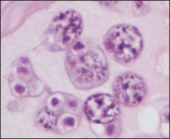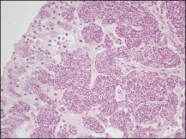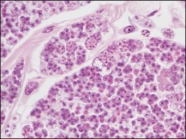WoRMS taxon details
Areospora rohanae Stentiford, Bateman, Feist, Oyarzún, Uribe, Palacios & Stone, 2014
819414 (urn:lsid:marinespecies.org:taxname:819414)
accepted
Species
marine
Stentiford, G.; Bateman, K.; Feist, S.; Oyarzún, S.; Uribe, J.; Palacios, M.; Stone, D. (2014). Areospora rohanae n.gen. n.sp. (Microsporidia; Areosporiidae n. fam.) elicits multi-nucleate giant-cell formation in southern king crab (Lithodes santolla). Journal of Invertebrate Pathology. 118: 1-11., available online at https://doi.org/10.1016/j.jip.2014.02.004 [details] Available for editors  [request]
[request]
Type locality contained in Magellan Strait
type locality contained in Magellan Strait [details]
Etymology The generic name refers to site of infection within the connective tissues of the host. The specific epiphet is derived...
Etymology The generic name refers to site of infection within the connective tissues of the host. The specific epiphet is derived from the given name (Rohana) of the daughter of the first author(Stentiford). [details]
WoRMS (2024). Areospora rohanae Stentiford, Bateman, Feist, Oyarzún, Uribe, Palacios & Stone, 2014. Accessed at: https://www.marinespecies.org/aphia.php?p=taxdetails&id=819414 on 2024-04-24
Date
action
by
![]() The webpage text is licensed under a Creative Commons Attribution 4.0 License
The webpage text is licensed under a Creative Commons Attribution 4.0 License
original description
Stentiford, G.; Bateman, K.; Feist, S.; Oyarzún, S.; Uribe, J.; Palacios, M.; Stone, D. (2014). Areospora rohanae n.gen. n.sp. (Microsporidia; Areosporiidae n. fam.) elicits multi-nucleate giant-cell formation in southern king crab (Lithodes santolla). Journal of Invertebrate Pathology. 118: 1-11., available online at https://doi.org/10.1016/j.jip.2014.02.004 [details] Available for editors  [request]
[request]
 Present
Present  Present in aphia/obis/gbif/idigbio
Present in aphia/obis/gbif/idigbio  Inaccurate
Inaccurate  Introduced: alien
Introduced: alien  Containing type locality
Containing type locality
From other sources
Etymology The generic name refers to site of infection within the connective tissues of the host. The specific epiphet is derived from the given name (Rohana) of the daughter of the first author(Stentiford). [details]
